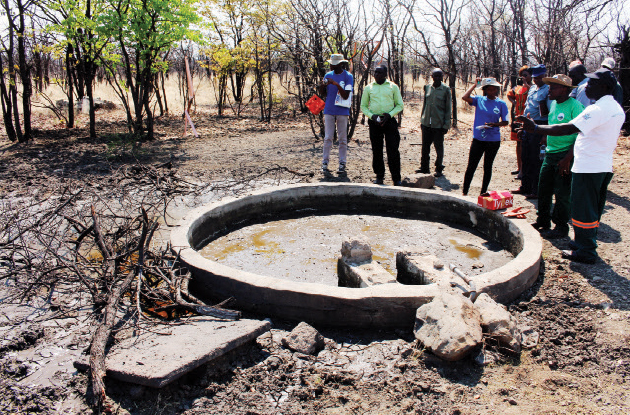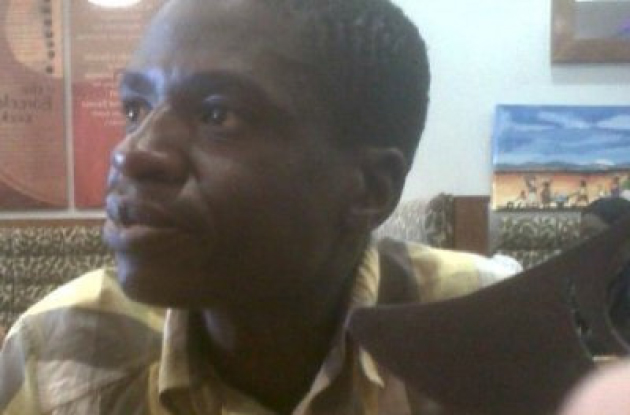Mixed reactions over prepaid water metres


Bulawayo residents and members of the civic society demonstrate against the installation of a pre-paid water system in in this file photo
Yoliswa Dube Features Reporter
WATER – the most common of basic commodities in life together with food – is about to enter a new realm of commodification in urban Zimbabwe. Urban local authorities want to install prepaid water meters at all commercial and residential properties.
However, public opinion is divided over the new project. While councils view the prepaid water meter primarily as a way of boosting revenue and improving service delivery, some sections of society feel it’s a ploy to deprive them of a basic commodity.
To many, water is a basic human right which should easily be accessible to all while others believe water should fully be paid for. Justin Ngwenya of North End suburb in Bulawayo says the prepaid water project is “criminal”.
“The moment you say no payment no water, you deprive those who can’t afford it. Why not allow them to use the water and let them pay as they go. That way, there’s universal access to clean water,” he noted.
Ngwenya warned the prepaid water project could meet with some stiff resistance in certain quarters of society. He also feels it would be naive to draw parallels between the prepaid water project and the electricity one.
Electricity, Ngwenya argued, can be substituted with other energy sources such as wood, solar and gas, among others, unlike water.
“Clean running water is a prerequisite for every home to function smoothly. It has no substitute. Water is a basic human right and once prepaid water meters are installed some people will not be able to access it,” said Ngwenya.
But the commoditisation of water in Zimbabwe remains a contentious issue up to this day. Citizens and human rights activists are continually at loggerheads.
Heated debates between members of the public and local authorities have been pivoted on whether or not the installation of prepaid water meters honours or flouts human rights.
A resident of Makokoba, John Nyoni, dismissed the prepaid water concept as a “recipe for disaster. He said the project was designed for the well-heeled members of society.
“Imagine you are in the middle of taking a shower and your tape suddenly runs dry. You shout to your wife demanding what is happening to the water and you are told that we have run out of cash water. Or worse still you got a baby and you need to wash some nappies. Some of us do not use pampers. What do you then do when you run out of water and you don’t have cash to buy coupons? This is a recipe for disaster as we are likely to have a cocktail of diseases if this thing is allowed to take off,” said Nyoni.
The prepaid water meter model demands that users pay upfront before accessing water services.
Water services are excluded for those who fail to pay just like in the same manner that one fails to access cellular phone services without purchasing airtime recharge tokens.
Discussions are in progress responding to the suitability of prepaid water meters in Zimbabwe. The debates are also meant to unpack how local authorities could maintain a level of viability and increase revenue collection in the face of failure by residents to settle their bills.
Local authorities and residents who are in support of the installation of prepaid water meters have embraced the new gadgets as the only way to ensure residents pay for the water they consume.
Innocent Tichaona of Nketa suburb believes prepaid water meters will enhance water sanitation and promote good health.
“People must pay for water just like they pay for any other services. While it’s understood that access to clean water is a basic human right, people need to understand that local authorities also need money to keep their operations running smoothly,” said Tichaona.
Under prepaid water meters, Tichaona observed, consumers are billed for what they use.
He says local authorities urgently need to educate people on the importance of councils having cash to sustain operations.
“There are a lot of services that residents require but these can’t be given for free. Local authorities across the country need revenue in order to function,” said Tichaona.
Residents across the country use water first before settling their bills at the end of each month under the conventional meter system.
However, local authorities have been facing difficulties to recover money from owing residents. The residents now owe local authorities millions of dollars in outstanding water and rates bills.
This is despite the fact that in 2013, government had to write-off all residents’ domestic debts to their respective local authorities.
Residents and human rights organisations have on several occasions demonstrated against local authorities demanding that the prepaid meter programme be shelved to allow further consultations.
Bulawayo United Residents Association secretary-general Samuel Moyo said it was important for residents to speak up about their right to access clean water.
“Water is basic human right, no one should be deprived of it. That is why we encourage you to speak up and condemn prepaid water meters,” said Moyo.
Studies on the introduction of prepaid meters in Southern Africa indicate that they are often introduced as a panacea to problems of water management such as failure to administer free water, failure to recover costs or debts and failure to control water consumption and wastage.
Government has since endorsed the prepaid water meter project.
The then Environment, Water and Climate minister, Saviour Kasukuwere, made known the government’s position on the new water meters during Parliament’s question-and-answer session in June.
“Water provision on its own requires somebody to pay for it,” Kasukuwere said then.
“We agree that water is a human right, but it is the transmission that must be paid for. People should pay for services so that they access clean, adequate water. If they do not pay, where will money to buy chemicals to treat the water come from? So the question of prepaid water meters is really meant to support councils and service providers to have enough capacity to service the communities with water.”
The then Local Government, Rural and Urban Development Minister, Ignatius Chombo, weighed in support of Kasukuwere.
He said pre-paid water meters will help local authorities replace obsolete water equipment and maintain infrastructure.
“Indeed, water is a right, but the water that we get in our homes is conveyed 89km and you need power. It is conveyed through pipes, stored in various tanks and is purified before you get it. So there is some cost to it.”
Chombo advised individuals in any local authority or any part of the country who might face difficulties in settling their water bills to engage council management and make payment plans.
It remains to be seen whether or not the proposed installation of these gadgets will bring more joy than misery to water consumers.











Comments